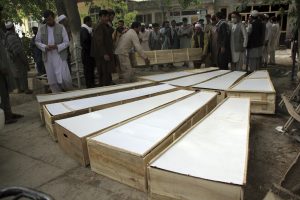In the evening of June 8, an unknown armed group entered a demining camp in Afghanistan’s Baghlan Province run by the HALO Trust, an international charity working to clear land mines in conflict and post-conflict zones around the world.
At least 10 young men were killed and 16 injured, according to statements from the HALO Trust.
Around 110 local men were in the camp at the time, having recently returned from a day of work clearing landmines.
The HALO Trust says that in the past 30 years, it has made safe nearly 80 percent of Afghanistan’s recorded minefields and battlefields.
In a video statement, HALO CEO James Cowan described the incident, saying, “What took place last night was genuinely horrific: Ten men, murdered in their beds.”
The HALO Trust has worked in Afghanistan since 1988, Cowan said, and has a staff of around 2,500 in the country. “Every day those 2,500 people — men and women — go out to help Afghans. They are Afghans. Every single one of them is a local member of staff. They risk their lives clearing landmines, and now they’ve given their lives to murder.”
Cowan was defiant, stating that the organization could — after this incident — decide to leave the country, but stressing it will do no such thing.
“We could take note of this incident and leave, we could be fearful of what is happening in Afghanistan. But we were there before 9/11, a full decade before. We’ve been through all the ups and downs of life and death in Afghanistan, and now as the international community prepares to leave, we’re going to stay. We do not do exit strategies. We are there for the people of Afghanistan and we still have a job to do.”
A familiar and circular round of blaming quickly ensued. According to an early report from TOLO News, the Afghan Interior Ministry blamed the Taliban. The Taliban denied any involvement, with VOA reporting that Taliban spokesman Zabihullah Mujahid called the attack “horrifying” and said the group did not have control of that particular district.
The Islamic State’s local affiliate, known as IS Khorasan Province (ISKP) then claimed the attack, alleging it had inflicted more than 60 casualties. HALO Trust cites 26 casualties in total.
VOA cited officials at the charity as claiming that “‘local Taliban’ came to the rescue of the victims and ‘scared the assailants off.’”
In his statement, which came out after much of the initial reporting (including VOA’s report), Cowan said that many of the men killed were of the embattled Hazara minority. VOA had cited charity sources as confirming that the armed assailants demanded the Hazara members of the team be delivered to them. Per VOA’s source, “When our staff refused to name them, the gunmen went from room to room mustering our staff.”
With ISKP claiming the HALO Trust attack, and nearly all of the other recent attacks and bombings targeting Hazaras, the conflict in Afghanistan is further escalating, adding new layers of strife. Not only is there the military and political battle for supremacy between the central Afghan government and the Taliban, but ISKP — a Sunni extremist group — is stoking a sectarian war in its strident and consistent targeting of the Shia Hazaras.

































